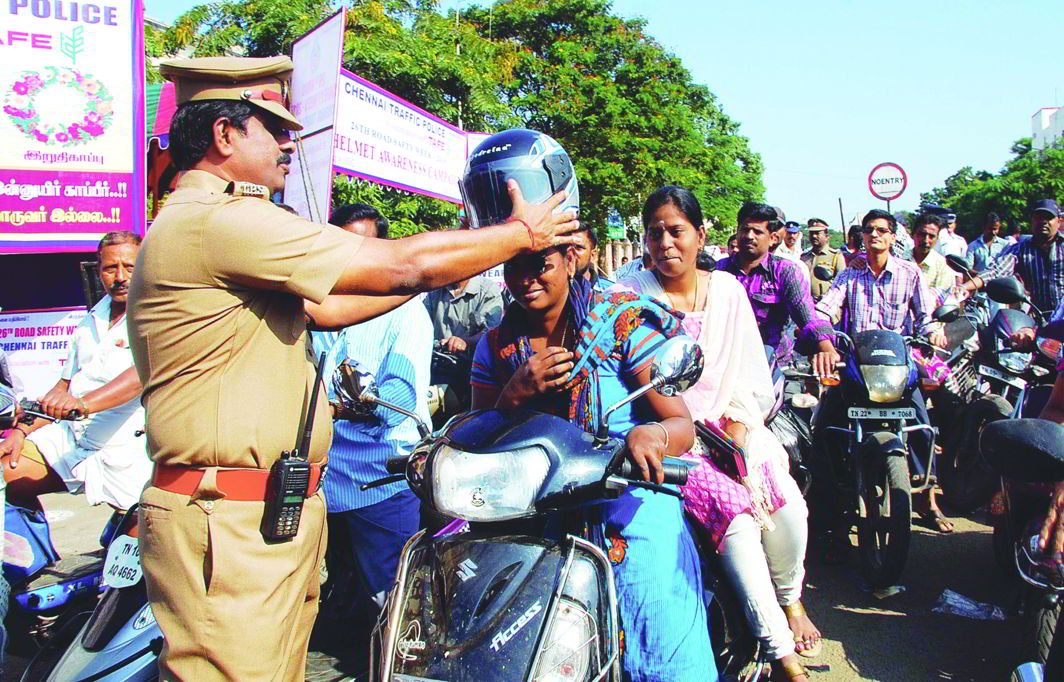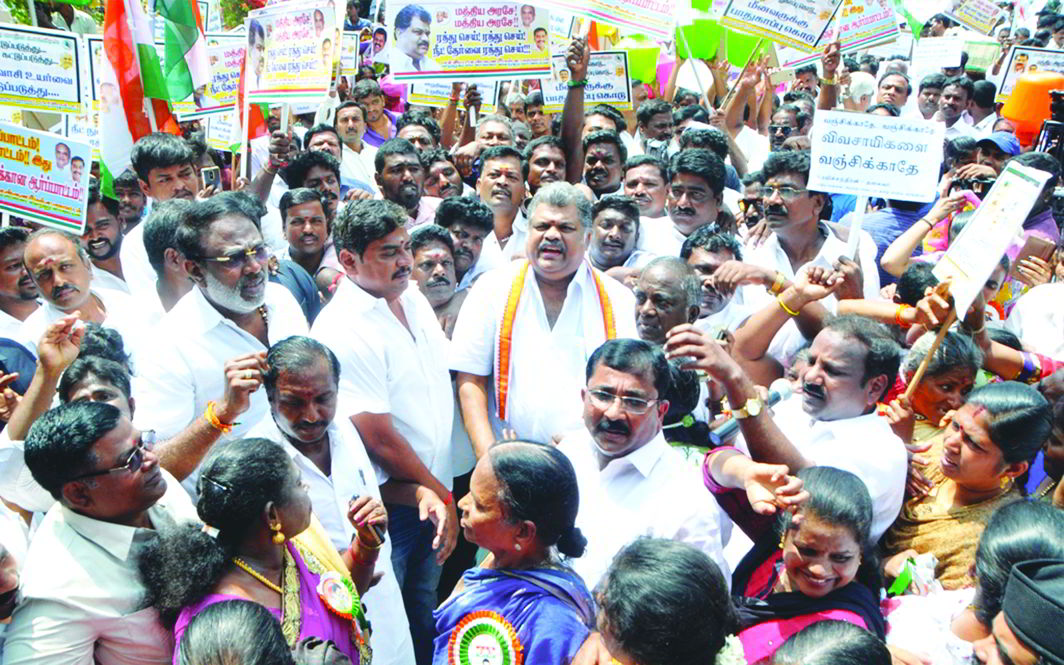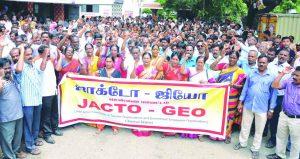Above: Justice N Kirubakaran has been a permanent judge of the Madras High Court since 2011. Photo: Youtube
Known for his unconventional judgments, this Madras High Court judge has often created a stir with his remarks on castration for child rapists, potency tests, NEET and compulsory helmet-wearing
~By R Ramasubramanian in Chennai
Are we not ashamed of opposing the NEET? Do you underestimate the ability of our students and the standard of education in Tamil Nadu? Do you feel that our students will not do better than students of other states? When all other states have not objected what is the reason for Tamil Nadu opposing it?”
These words were uttered not by any political party, intellectual, academician or mediaperson, but by Justice N Kirubakaran, a judge of the Madras High Court. He made these observations in March while hearing a batch of petitions seeking allotment of 50 percent of PG seats in medicine in private colleges for the government quota. The petitioners included not only students and parents but the Tamil Nadu government. The judge posed these questions when the counsel for the state health department brought to the notice of the Court that the Tamil Nadu assembly had passed a bill to exempt the state from NEET (National Eligibility and Entrance Test) and it was pending with the president. Justice Kirubakaran made these remarks when the whole state was raging against the NEET exam.
Justice Kirubakaran is an interesting personality in the Madras High Court and is known for his unconventional judgments and open remarks on varied subjects. These include unverified advocates, castration for child rapists, pulling up government teachers who joined strikes and making helmet-wearing compulsory for two-wheeler riders in Tamil Nadu. His rulings will definitely nudge legal researchers and journalists interested in analysing judicial verdicts to delve deeply into studying the constitution. Some of the controversial subjects he has spoken on are:
POTENCY TESTS
In August 2014, Justice Kirubakaran directed the central and Tamil Nadu governments to respond to a query whether it was not necessary to make premarital clinical examinations mandatory. “This view was taken after observing a quick rise in divorce petitions due to impotency and frigidity,” he said. This unconventional direction of the judge created debates on several television channels across the country. In one of the TV discussions, Dr R Bhonsle, a sexologist, said: “Actually 90 percent cases of so-called impotency are psychogenic or psychological. In many cases, a good sexual relationship may not be established because of situational or relational issues. There is no test to confirm till date that a man is impotent for a biological reason. There is also no exact test to decide whether a person will get an erection or not. Similarly, there is no method to examine a woman and suggest frigidity because of biological reasons. There are tests which might suggest so but none can establish any result beyond doubt. A semen test can only tell about fertility and not potency.”

CASTRATION
In October 2015, while dealing with a case related to child rape, Justice Kirubakaran said: “When law is ineffective and incapable of addressing the menace, this court cannot keep its hands folded and remain a silent spectator unmoved and oblivious of the recent happenings of horrible blood-curdling gang rapes of children in various parts of India.” He added: “Castration for child rapists would fetch magical results in preventing child abuse.”
UNVERIFIED ADVOCATES
Yet another interesting order by Justice Kirubakaran directed the Bar Council of Tamil Nadu to check the growth of those who had secured law degrees with a basic qualification of MA obtained through open universities. The issue cropped up when he was dealing with a petition by 17 MBBS students of a private medical college. They were seeking transfer to a state-run institution due to a dispute between the trustees of their college. Advocates had been engaged to resolve the problem.
But suddenly the hearing took a new twist when the advocate-general of Tamil Nadu told the court that persons who had not even passed Class VI or VII were able to procure open university MA degrees and get into law colleges and secure BL or LLB degrees.

Justice Kirubakaran termed this shocking and directed the Tamil Nadu Bar Council and the advocate-general to cancel the membership of 713 lawyers who had got their law degrees in such a manner.
Accordingly, the Bar Council of Tamil Nadu passed a resolution suspending the 713 advocates from practising and later issued show-cause notices to them. But this order was stayed by a division bench headed by the Chief Justice of the Madras High Court, Justice Indira Banerjee, after hearing some of the affected lawyers who were so affected. The bench transferred the matter to a full bench. But a large section of lawyers felt that the single judge’s order was erroneous. “I welcome Justice Kirubakaran’s earnest attempts to regulate law education. But the solution is definitely not banning lawyers who got their degrees in such a manner. It would have been better if such graduates were put through rigorous testing and training and allowed to practise,” said M Vetriselvan, a lawyer and an activist.
SOCIAL MEDIA OUTRAGE
While dealing with a case related to Tamil Nadu government school teachers boycotting classes and joining a strike with other government employees, the judge asked whether “the striking government schoolteachers were not ashamed of the fact that only five students from government schools made it to the MBBS course in 22 government medical colleges in Tamil Nadu this year”. After this pulling up by the judge, there was strong criticism against him in social media.
The Tamil Nadu government then informed the judge that they were taking action against those who posted abusive comments against him. So far, the police have arrested 11 people for trolling and abusing Justice Kirubakaran. Those arrested include a 65-year-old man.
Courting Controversy
On NEET: “Are we not ashamed of opposing the NEET? Do you underestimate the ability of our students and the standard of education in Tamil Nadu?”
On Potency Tests: “This view [of whether premarital clinical exams are a must] was taken after observing a quick rise in divorce petitions due to impotency and frigidity.”
On Castration of Child Rapists: “This court cannot keep its hands folded… Castration for child rapists would fetch magical results in preventing child abuse.”
On Striking School teachers: “They were not ashamed of the fact that only five students from government schools made it to the MBBS course this year.”
HELMETS

On July 1, 2015, Justice Kirubakaran passed an order making it compulsory for two-wheel drivers to wear helmets. Opposing this order, several lawyers in the Madurai bench of the Madras High Court took out a huge procession inside the Court premises. Later, around 150 lawyers from Madurai came to Chennai and tried to barge into the court hall of a division bench which was hearing contempt proceedings against two advocates from Madurai for undertaking a procession defying the compulsory helmet rule. The protesting lawyers raised slogans against the judges and the ruckus continued for over an hour.
Born on August 21, 1959, Justice Kirubakaran started his practice in Madras High Court in 1985. He handled arbitration, sales tax, customs and excise, rent control and criminal cases during his tenure. He worked as an additional central government standing counsel and became an additional judge of the Madras High Court on March 31, 2009. He was made a permanent judge on March 29, 2011.
The unanimous opinion in both the bench and the bar about Justice Kirubakaran is that he is incorruptible and has an appreciable social conscience. However, P Sundararajan, an advocate in Madras High Court, said: “Justice Kirubakaran has failed to grasp or understand certain basic tenets of human psychology and the social structure of India. This is sadly a genuine problem and is not only affecting the bench and bar but society, too.”
Nonetheless, he has made a mark in the judiciary with his no-nonsense attitude and bold judgments.


